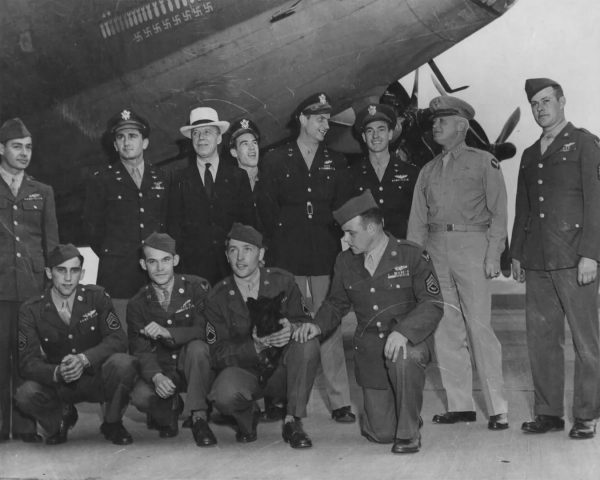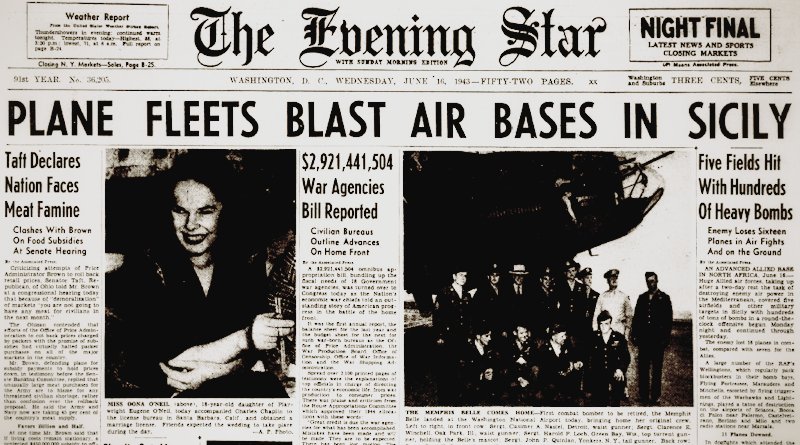World War II Chronicle: June 16, 1943
Click here for TODAY’S NEWSPAPER
The crew of the B-17 bomber Memphis Belle, the first B-17 crew and plane to complete 25 combat missions over Europe, is pictured on today’s front page.

On page five is Capt. Clark Gable, who is making instructional videos for aerial gunners… George Fielding Eliot column on page eight… Sports section begins on page 44, and the Eagles and Steelers are filing paperwork to merge their football teams. Speaking of the Eagles, Harry H. Benson played six games with Philadelphia in 1935 and enlisted in the Army in January 1935. He enlisted in the Army in January 1941 and was killed on Attu Island on May 14…
Also on page 44, the Chicago White Sox and Washington Nationals will form a team to play against Mickey Cochrane’s Great Lakes Navy ballclub on June 30…
Roving Reporter by Ernie Pyle
(One of a series on a 13,000-mile flight made before Tunisia fell.)
SOMEWHERE IN AFRICA — We are apt to think of Saturday night as a peculiarly American institution. But like a lot of other things we just assume belong to us, Saturday night is universal.
It is the night to howl, the world over. That holds just as true in the jungles as on Broadway. Everywhere in the jungle the natives dance and drink and sing on Saturday night.
So one Saturday night in Liberia we went across the river to see a village dance. A native boy rowed us across the black water in a long dugout canoe.
The dance was in full swing when we got there. The “music” was furnished by one Negro boy pounding on a knee-high tom-tom with his bare fingers, and by another whacking on an old 20-gallon oil can with two sticks.
The dancers were about ten Negro girls in long cotton-print dresses, half a dozen or so young men, and a scattering of grinning, half-naked kids. As far as I could ever see, the dance consisted of nothing more than hopping around in a big circle.
There were already some soldiers standing around when we arrived. Some of the Negro boys in the village worked as houseboys for the Americans, so one of them came over and got chairs for us.
To tell the truth, the dance was pretty tame. Gradually the American soldiers, as they do the world over, decided they wanted a little more life in it. It was their wish and desire that the dancing girls take off their blouses. It was not an especially outlandish request, since the girls go around all week without any blouses. The Americans wanted to get the real jungle touch, you know, such as you see in pictures.
Well, negotiations for the hoped-for strip tease started through the houseboy who worked for the lieutenant with us. The houseboy left to put the matter before the chief.
Pretty soon a different Negro boy came back, stood directly in front of us, and made a speech. It was in pretty good English, fairly formal, and very flowery.
He was, he said, speaking as an official representative of the chief, welcoming us to the village. The chief was proud to have us, sent his royal respects, and hoped we were enjoying the dance. Anything the village had was ours.
We were touched. It might well have been Sumner Welles welcoming the new ambassador from Brazil. We were ashamed we’d thought of anything so crude as our strip-tease request. We abandoned the whole idea, and the lieutenant was just rising to deliver a courtly reply to the chief’s welcome, when the boy launched into the second half of his prepared address.
And that, ladies and gentlemen, was to the effect that if we could scare up the nominal sum of six bucks among us, the fief would attend to the blouse business in a big way!
The lieutenant was pretty sore over this, especially when it came out that the other soldiers had already forked over four dollars for the same purpose. But it looked like all or nothing, so we dug up six dollars and, by shaking ourselves, once more achieved the transition from ministers plenipotentiary back to ordinary guys from the front row.
And then for an hour the dance went on, just as usual. Every ten minutes or so the lieutenant would send word to the chief that we were still waiting and to hurry up.
The chief, who looked like any other Negro you ever saw, was sitting in dignity on his back porch about 20 feet away, but the business had to be conducted through an emissary. Each time the chief would send back word to be patient, that such things took time.
Finally, after another half our the lieutenant got mad and went in person to the chief. They palavered a long time. When he came back he said the chief was practically in tears.
The whole affair was off, and the chief had given our money back. The girls had refused to obey his command. They didn’t mind taking off their blouses, since they don’t wear any at all week anyhow. That wasn’t the trouble. They were just using it for an issue.
The chief confessed to the lieutenant that his power over the village had been slipping for some weeks. Tonight was the showdown. He had been defied tonight, and he couldn’t publicly lose face like that and keep his hold. He was finished. Poor chief.
We got in the canoe and rowed back across the river. The girls were dancing and laughing their defiance of the chief when we left, and we could still hear the tom-toms back at camp.
The whole thing was a confusing study in human psychology. As a dance, it wasn’t half as good as you’d find in any Saturday-night cotton patch in our own South. But as a study in drawing room neurotics Noel Coward himself couldn’t have produced a better one.
And as a final puzzle in our psychological drama, why are soldiers anxious to pay ten bucks on a Saturday night for the same thing they can stand around and look at all week for nothing? Don’t ask me, I’m just a stranger myself.
Evening star. (Washington, D.C.), 16 June 1943. Chronicling America: Historic American Newspapers. Lib. of Congress.
https://chroniclingamerica.loc.gov/lccn/sn83045462/1943-06-16/ed-1/
